Hey all,
It’s true: Civilization 5 has been released and my soul has been taken captive once again. I’ll be playing “just one more turn” into the wee hours of the morning this weekend for sure.
Sid Meier’s Civilization 5 (known as “Civ 5” to the in-crowd) is the latest incarnation of Sid Meier’s Civilization series, a series whose roots go all the way back to 1991. In all of the Civilization games, the player takes the role of a civilization’s leader and must guide his or her people through the various phases of human history, competing with computer-controlled civilizations and ravaging barbarians. The player builds units, develops cities and infrastructure, directs the civilization’s research, and conducts diplomacy. Maintaining a careful balance of all of these elements is key to building an empire that can stand the test of time.
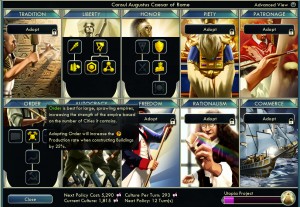
The policy screen gives the player considerable choice in customizing their empire. You can choose to generate more cash, build wonders faster, or reduce unhappiness from occupying foreign cities.
The game is quite a bit different from its last incarnation. Religion is gone. Governments are gone. Sabotage is gone. No longer do players need to concern themselves with the happiness of individual cities; instead the happiness of the civilization is determined by a single number.
So what’s left in Civilization 5? One nice change in Civilization 5 is the movement away from the dual-attribute system that gave bonuses in Civ 4; instead each civilization has their own unique unit(s), building(s), and special power. The powers are wide and varied and I can’t help but thinking that some of them are incredibly imbalanced. For instance, Rome’s special ability, “The Glory of Rome,” gives a 25% bonus to building production for any city that is building a building which already exists in Rome…building. In my Rome game, this has helped immensely as I’ve had the extra coin available to purchase every building possible in my capital city, effectively making my entire civilization build buildings 25% faster. Cool! I think that the special powers are great because they add a great deal of replayability to the game, but have the potential to be quite overpowered under certain circumstances.
The most interesting difference between Civ 5 and its predecessors is how much you chose to customize your empire. In place of government options and religion the player gets choice in Social Policies. Social Policies are perks that are earned by accumulated culture, and each chosen Social Policy provides a small boost to a single attribute of the player’s civilization. The Social Policies are arranged into ten different trees, each providing focused benefits. For instance, there is the “Order” tree, which grants benefits to production and happiness, and is particularly good for large empires, whereas the “Patronage” tree provides many bonuses to relations with city-states, and “Piety” provides benefits to civilization happiness. There are a few trees which are incompatible with one another (e.g., Piety and Rationalism trees), but for the most part the player is free to choose which trees to go down to fit their intended play style.
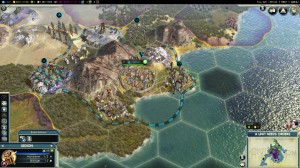
Befriending city-states provides a number of tangible benefits, like gold, units, or resources. Conquering city-states inflates your ego.
Did I just say city-states? Why, yes! They’re a new feature in Civ 5. City-states are powerful cities (duh) scattered around the world that aren’t competing to win the game, but can provide a nice benefit if you be friend them. Sometimes they’ll gift you units, or gold, or additional resources, depending on the type of city-state and how much they like your empire. Empires can also declare that a particular city-state is under their protection, in an attempt to frighten off potential aggressors (and to improve relations with the city-state, naturally).
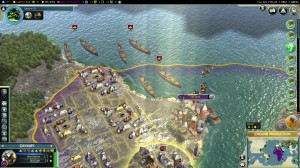
Ground troops no longer require a separate naval vessel to travel across water (with the appropriate technologies, of course). Embarking ensures that no cities are safe from the Roman Empire!
Combat has also been entirely overhauled. You can no longer build dozens of units and put them all on the same square. For one thing, the game uses a hexagonal board instead of a square one, so quadrophiles may be disappointed. For another, each hex can now only support one (1) military unit and one (1) non-combat unit. This causes armies to be spread out and subject to attacks from multiple defenders. The units are balanced loosely in a rock-paper-scissors format, but good positioning can still make all the difference. A city may be a ripe target for a handful of attackers, but add in a bunch of defensive bonuses and the ability for cities and archer units to bombard a square away, and suddenly it becomes a bit tricky (and costly) to assault.

Diplomacy will play a key role in your strategy regardless of which path to victory you are taking. Don't piss off too many historical figures.
But if those cities are too hard to take by force, there are still other options to victory. The player can woo the world with their cultural achievements; or be the first to send a space craft to Alpha Centauri; or be elected President of the Entire World; or just have the highest score in 2050 A. D. I would have liked to see some kind of economic victory, a la Alpha Centauri, but the multitude of options is still satisfying and provides for much replayability, particularly when coupled with the Social Policies system.
On your way to victory, you’ll have to contend with your rivals. Each rival leader will have their own personality and agenda. Some of them you’ll want to be friends with, allies through thick and thin. Each rival nation has an historical figure leading them, with whom you can propose agreements (or disagreements, as the case may be). While I haven’t done so myself, I believe that it would be possible to have a “proxy war” by donating many units to a city-state at war with a rival. The diplomacy is good, though I feel like the diplomacy screens themselves could be less cryptic in precisely what things mean. For instance, I can propose a “Pact of Cooperation” with a figure, but the game doesn’t tell me right there why that would be to my benefit (or to my rival’s). The information is available in the Civilopedia, the in-game glossary, but having it handy would be nice too.
Another nice touch in the interface is how the game will alert the player whenever a city completes its current project: the “End Turn” button becomes a “Choose Production” button. It also makes sure that the player has a research project each turn. This helps to ensure that cities aren’t sitting around producing Wealth (i.e., extra cash) instead of building Giant Death Robots. It’s a nice feature that makes the game less tedious to play, and consequently, more fun. I don’t recall if this was available in previous Civ games, but it’s a welcomed feature none-the-less.
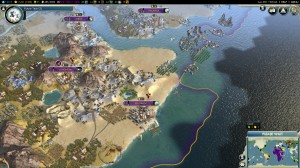
I didn't realize that I had so much infrastructure in the water. I hope that those mines are doing well in the Gulf Coast.
The game play is pretty solid, but I have encountered a few graphical bugs and other issues that made my initial jaunt into Civ 5 less enjoyable. Occasionally the terrain squares (ahem! hexes!) would not update their textures unless I zoomed in and out a few times. More seriously, a few times the graphics glitched and showed ghost units hovering around the screen. Neither of these issues were game-breaking, but they were annoying and caused me to restart the game.
Lastly, there was the issue of time spent waiting for the computer to make its moves: it can suck with larger maps. I’ve got a decent gaming rig going on but the later stages of the game on “Huge” map settings are tedious. Each turn, I’ll make a half a dozen decisions about what to build or where to move, and then have to wait for several minutes while the game moves the AI units and makes decisions. That’s pretty bad. I understand that I brought some of this on myself, but it is still annoying to not want to finish a game that I’ve dumped almost 20 hours into because each move takes 5 minutes to complete.
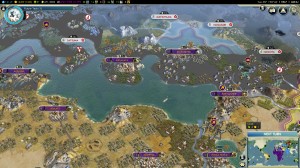
Managing a large and sprawling empire is challenging as it is satisfying, even with a few graphical bugs.
Bugs and omigosh long compute times aside, Civ 5 is a good game. I don’t think that it’s phenomenal, but it’s good. I don’t think that it’s a game that has redefined the turn-based genre, but that’s because it hasn’t set out to do so. What it is is an evolutionary step for the series and a highly addictive gaming experience. I can definitely see it hogging more than a couple of my weekends in the years to come. At least 8 stampeding jackalopes out of 10 would enjoy it.
Until next time, I’ll be building an empire to stand the test of time!
Cheers,
-S

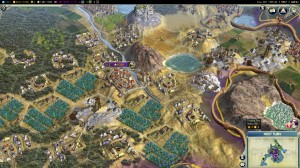
Comments
Havick said: 6 October 2010 at 20:57
Loved the review Sunhawk. I’ll have to buy and try this one out. I always loved this Civ games however haven’t really played them all that much in the last 2 series. I’ll have to give it another go! Great review man.
Sunhawk said: 12 October 2010 at 21:14
Thanks for the props, Havick! I very much appreciate knowing that the hard work isn’t going to waste! 🙂
As far as the Civ games go, they’re all pretty solid. If you have the time to dump into them they are incredibly deep and full of strategery.